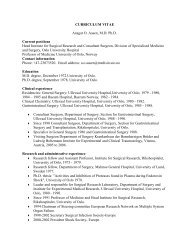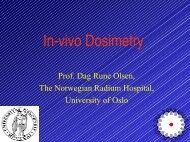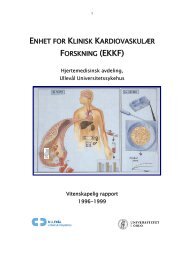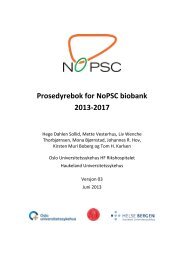Novel genetic and epigenetic alterations in ... - Ous-research.no
Novel genetic and epigenetic alterations in ... - Ous-research.no
Novel genetic and epigenetic alterations in ... - Ous-research.no
Create successful ePaper yourself
Turn your PDF publications into a flip-book with our unique Google optimized e-Paper software.
DiscussionThese examples underl<strong>in</strong>e that we have molecular k<strong>no</strong>wledge that can help to determ<strong>in</strong>e amore optimal treatment regime <strong>in</strong> a more <strong>in</strong>dividualized way than what is performed today.The problem is that studies seek<strong>in</strong>g to establish these facts all are lack<strong>in</strong>g, prevent<strong>in</strong>g themolecular k<strong>no</strong>wledge from be<strong>in</strong>g adapted <strong>in</strong>to cl<strong>in</strong>ical use[130;179].Survival analysesSurvival analyses are often used to measure the effect of a certa<strong>in</strong> drug or a certa<strong>in</strong> markeron cl<strong>in</strong>ical outcome. The different endpo<strong>in</strong>ts are plentiful <strong>and</strong> the mean<strong>in</strong>g of each can beconfus<strong>in</strong>g as the same cl<strong>in</strong>ical endpo<strong>in</strong>t can have different def<strong>in</strong>itions. These differencesmake it complicated to compare results from different studies <strong>and</strong> highlights the need formore uniform <strong>and</strong> well-def<strong>in</strong>ed def<strong>in</strong>itions of endpo<strong>in</strong>ts[198].Overall survival is maybe the most unambiguous of the endpo<strong>in</strong>ts <strong>in</strong> survival analyses. It iseasy to def<strong>in</strong>e, simple to measure <strong>and</strong> straightforward to <strong>in</strong>terpret[199]. However, the factthat all k<strong>in</strong>ds of mortalities are registered as events may lead to mis<strong>in</strong>terpretation of theresults as colorectal patients often are of old age <strong>and</strong> may die of other reasons than cancerwith<strong>in</strong> the follow-up period[200]. Disease-specific survival is an attempt to improve this. Aproblem that presents itself with this type of analysis is that sudden deaths of cancer patientsare often registered as cancer-related deaths while the real cause may be different, lead<strong>in</strong>g toan overestimation of cancer-related deaths[200]. This problem is circumvented with overallsurvival, but aga<strong>in</strong>, that approach has its limitations <strong>in</strong> be<strong>in</strong>g over simplistic. A<strong>no</strong>therchallenge with survival analyses is the requirement/need for long (<strong>and</strong> partly costly) followup period. A large study showed with a correlation of 0.89 that 3-year disease-free survival isa good surrogate endpo<strong>in</strong>t to 5-year overall survival as most of the disease-specific eventswhich occurred with<strong>in</strong> the first three years (such as local recurrences <strong>and</strong> metastases) led todeath with<strong>in</strong> 5 years as most patients with a recurrent disease had died[199]. This f<strong>in</strong>d<strong>in</strong>g canhave a significant impact on development <strong>and</strong> cl<strong>in</strong>ical test<strong>in</strong>g of <strong>no</strong>vel drugs as the time ofcl<strong>in</strong>ical trails could be reduced to almost the half of its orig<strong>in</strong>, dramatically reduc<strong>in</strong>g theexpenses.60
















